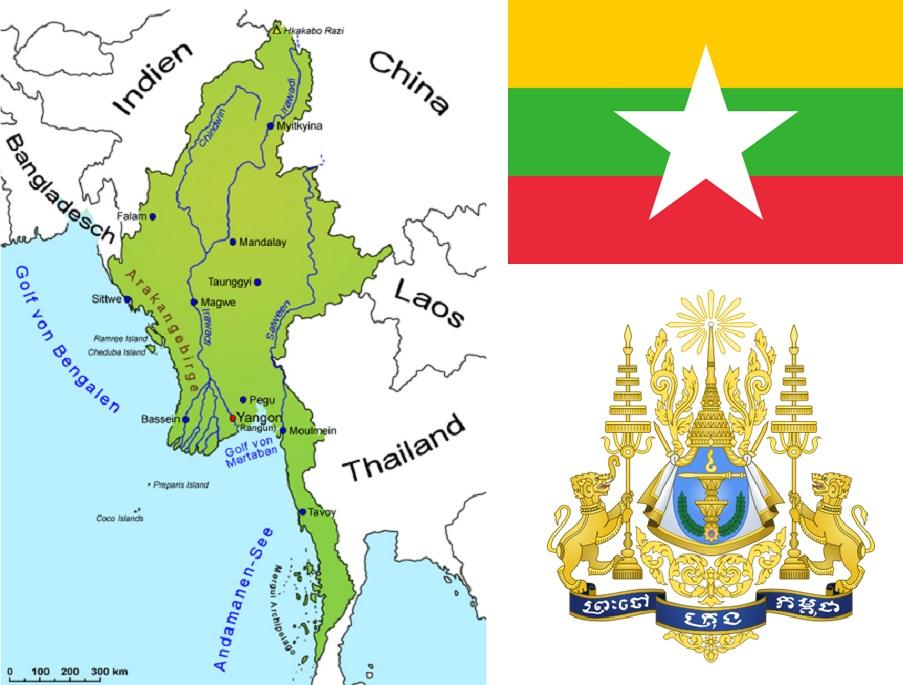In a troubling escalation of violence in Myanmar’s Kachin State, junta troops have reportedly shot and detained two officials from the Kachin Independence Organization (KIO) in Myitkyina. This incident underscores the ongoing tensions in the region as military forces continue to clash with ethnic armed groups amid the broader turmoil following the 2021 coup. Eyewitness accounts and local reports suggest that the operation occurred during a period of increased military activity in the area, raising concerns over the safety of civilians and the stability of the fragile ceasefires that have existed in previous years. As the situation unfolds, local communities are bracing for the potential fallout from the junta’s aggressive tactics against dissent and opposition forces.
Myanmar Junta’s Increasing Military Aggression: KIO Officials Targeted in Myitkyina
The recent military actions in Myitkyina have raised alarm as troops affiliated with the junta targeted officials from the Kachin Independence Organization (KIO). Reports indicate that two KIO representatives were shot at and subsequently detained by the military, marking a significant escalation in the ongoing conflict between ethnic armed groups and the ruling junta. Eyewitnesses describe a chaotic scene as the incident unfolded, with heavy military presence in the area contributing to fears among local residents. This aggressive maneuver underscores the junta’s ongoing efforts to suppress dissent and consolidate power in regions inhabited by ethnic minorities.
Community leaders and human rights advocates are calling for immediate action and accountability regarding the rising violence. The treatment of KIO officials is symptomatic of a broader trend of systematic oppression that has intensified since the February 2021 coup. The junta’s tactics are poignant reminders of the precarious situation facing ethnic groups in Myanmar, leading to increased tensions and a desperate call for international intervention. The implications of these attacks are far-reaching, affecting not just the involved parties but also the stability of the region as a whole.
Implications for Local Governance and Ethnic Relations Amid Rising Tensions
The recent incident involving the shooting and detention of two Kachin Independence Organization (KIO) officials in Myitkyina underscores the precarious state of local governance and ethnic relations in Myanmar. As tensions heighten, local administrative structures are increasingly challenged by the military regime’s aggressive tactics. This situation complicates the fragile balance of power among ethnic groups and raises concerns about governance efficacy. In an environment where the central government seeks to exert its control, local decision-making bodies, often populated by representatives from various ethnic communities, struggle to maintain a semblance of authority. The ramifications of these conflicts may lead to further isolation of ethnic administrative frameworks, potentially undermining long-term peace-building efforts in the region.
Furthermore, the local populace finds itself at a crossroads, caught between allegiance to their ethnic identity and a growing resentment towards the military junta. This complex dynamic could manifest in various ways, including:
- Increased Mobilization: Ethnic communities may mobilize in defense of their leaders and protect their rights.
- Strained Inter-Ethnic Relations: Incidents like this could exacerbate existing tensions among different ethnic groups, leading to distrust and conflict.
- Humanitarian Challenges: Escalating violence can impede humanitarian efforts, leaving vulnerable populations without crucial support.
To provide a clearer view on the shifting landscape, the table below outlines the recent incidents and their implications for ethnic relations:
| Incident Date | Description | Implications |
|---|---|---|
| October 2023 | Shooting of KIO officials | Heightened tensions between junta and ethnic groups |
| September 2023 | Peace negotiation breakdown | Increased risk of armed conflict |
| August 2023 | Protests in Myitkyina | Community solidarity and calls for autonomy |
The trajectory of local governance and ethnic relations in Myanmar remains uncertain. As the military junta continues to assert its dominance, local leaders, particularly those from ethnic backgrounds, must navigate these treacherous waters to advocate for their communities while also managing the escalating risks associated with military reprisals.
Calls for International Intervention and Support for Human Rights in Myanmar
In the wake of the recent incident in Myitkyina, where Myanmar junta troops shot and detained two officials from the Kachin Independence Organization, the call for international intervention has intensified. Human rights organizations are urging global leaders to take a stand against the escalating violence and human rights abuses perpetrated by the military regime. Witnesses described a chaotic scene, with fears mounting that such arbitrary actions only serve to embolden the junta’s oppressive tactics and suppress peaceful dissent. The international community is increasingly being pressed to address the dire humanitarian situation in Myanmar, where civilians are caught in the crossfire of ongoing conflict.
International bodies like the United Nations and regional organizations are being urged to act decisively to hold the military accountable and ensure the safety of civilians. Efforts could include:
- Imposing sanctions on military leaders and associated entities.
- Enhancing humanitarian aid for displaced populations and affected communities.
- Creating platforms for dialogue between the Myanmar government and ethnic groups.
- Supporting local organizations that document human rights violations.
As the situation deteriorates, the importance of international solidarity and support for the restoration of democracy and human rights in Myanmar cannot be overstated. A coordinated response is essential to mitigate the impact on vulnerable populations and to help bring about lasting change.
The Conclusion
In conclusion, the incident involving the shooting and detention of two Kachin Independence Organization (KIO) officials by Myanmar junta troops in Myitkyina underscores the escalating tensions in the region. As the military continues its crackdown on ethnic minority groups and dissenting voices, the implications of such actions resonate far beyond local borders. Human rights organizations and international observers will undoubtedly be monitoring the situation closely, as calls for accountability and transparency grow louder. The developments in Myanmar remain crucial not only for the country’s fragile political landscape but also for the broader quest for peace and stability in the region. As this story unfolds, continued scrutiny will be essential to ensure that those affected receive justice and that the voices advocating for democracy are not silenced.
